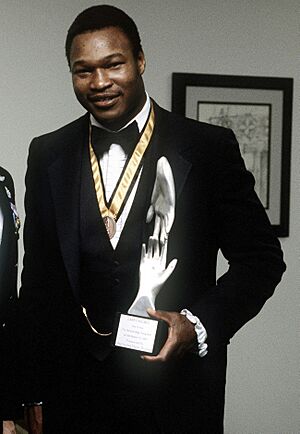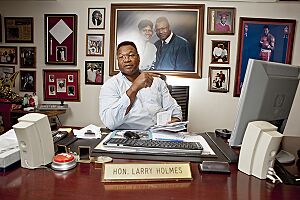Larry Holmes facts for kids
Quick facts for kids Larry Holmes |
|
|---|---|
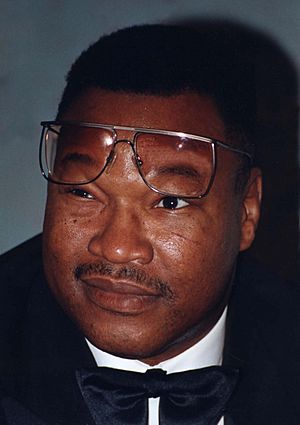
Holmes in 1996
|
|
| Statistics | |
| Nickname(s) | The Easton Assassin |
| Rated at | Heavyweight |
| Height | 6 ft 3 in |
| Reach | 81 in |
| Born | November 3, 1949 Cuthbert, Georgia, U.S. |
| Stance | Orthodox |
| Boxing record | |
| Total fights | 75 |
| Wins | 69 |
| Wins by KO | 44 |
| Losses | 6 |
Larry Holmes (born November 3, 1949) is an American former professional boxer. He competed from 1973 to 2002 and was the world heavyweight champion from 1978 to 1985. Many people think he is one of the best heavyweight boxers ever. He grew up in Easton, Pennsylvania, which is why his boxing nickname was "the Easton Assassin".
Larry Holmes was famous for his powerful left jab, which many say was one of the best in heavyweight boxing history. He held the WBC heavyweight title from 1978 to 1983. He also held the Ring magazine and lineal heavyweight titles from 1980 to 1985. Later, he became the first IBF heavyweight champion from 1983 to 1985.
Holmes won his first 48 professional fights! He beat famous boxers like Ken Norton (who he won his first championship from in 1978), Muhammad Ali, Earnie Shavers, and Gerry Cooney. He almost matched Rocky Marciano's record of 49 wins without any losses, but he lost his 49th fight to Michael Spinks in 1985. Larry Holmes retired after losing a rematch to Spinks the next year, but he came back to box several times. He tried four more times to win a heavyweight title but was not successful. He fought his last match in 2002 when he was 52 years old. He ended his career with 69 wins and only 6 losses. All his losses were in world title fights.
Larry Holmes is often seen as one of the greatest heavyweight boxers of all time. He has been honored in both the International Boxing Hall of Fame and the World Boxing Hall of Fame. He is the only boxer to have defeated Muhammad Ali by a referee stopping the fight. He is also the last living boxer who defeated Ali as a professional.
Contents
Early Life and Family
Larry Holmes was the fourth of twelve children. His parents were John and Flossie Holmes. In 1954, his family moved to Easton, Pennsylvania. Larry's father worked as a gardener in Connecticut and visited the family every three weeks until he passed away in 1970. His mother, Flossie Holmes, said, "He didn't forsake us. He just didn't have anything to give." The family lived on welfare. To help his family, Larry left school in the seventh grade. He worked at a car wash for $1 an hour. Later, he drove a dump truck and worked in a quarry.
Amateur Boxing Journey
Larry Holmes started boxing when he was 18 years old. In 1972, he fought in the semifinals of the Olympic Trials. He was chosen to fight at the Olympic box-offs, where he faced Duane Bobick. Holmes was knocked down in the first round. He got back up and kept fighting, but he was disqualified for holding his opponent too much.
Becoming a Professional Boxer
Starting Out
After winning 19 of his 22 amateur fights, Larry Holmes became a professional boxer on March 21, 1973. He won his first fight against Rodell Dupree. Early in his career, he practiced with famous boxers like Muhammad Ali, Joe Frazier, and Earnie Shavers. He learned a lot from them. Holmes said, "I was young, and I didn't know much. But I was holding my own sparring those guys. I thought, 'hey, these guys are the best, the champs. If I can hold my own now, what about later?'"
Holmes became known as a serious contender when he beat Earnie Shavers in March 1978. Holmes won by a clear decision after twelve rounds. This win led to a championship fight for Holmes against WBC Heavyweight Champion Ken Norton.
Winning the WBC Heavyweight Title
Larry Holmes fought Ken Norton for the WBC Championship on June 9, 1978. After fourteen rounds, the fight was tied. Holmes fought hard in the last round and won the title by a close decision.
In his first two title defenses, Holmes easily knocked out Alfredo Evangelista and Ossie Ocasio. His third defense was against Mike Weaver on June 22, 1979. Weaver was not expected to win, but he fought well. After ten tough rounds, Holmes knocked Weaver down. In the twelfth round, Holmes kept hitting Weaver until the referee stopped the fight. Holmes said, "This man knocked the devil out of me. This man might not have had credit before tonight, but you'll give it to him now."
Three months later, Holmes had a rematch with Shavers. Holmes was ahead for six rounds, but in the seventh, Shavers knocked Holmes down with a powerful punch. Holmes got up and kept fighting. The referee stopped the fight in the eleventh round because Holmes was hitting Shavers so hard.
The Fight Against Muhammad Ali
On October 2, 1980, Larry Holmes defended his title against Muhammad Ali. Ali was coming out of retirement to try and win a world heavyweight title for the fourth time. Holmes was much stronger than the 38-year-old Ali. Holmes won every round. At the end of the tenth round, Ali's trainer stopped the fight because Holmes was hitting Ali so much. This was the only time Ali lost a fight by a referee stopping it. After this win, Holmes was also recognized as the World Heavyweight Champion by The Ring.
Ali later said his poor performance was due to medication he was taking. Holmes felt sad about hitting Ali so much during the fight. He even cried in an interview afterward. He said he respected Ali "a whole lot" and that Ali "fought one of the baddest heavyweights in the world today, and you cannot take credit from him." Some people believe this fight contributed to Ali's health issues later in life.
More Title Defenses
After eight wins by knockout, Holmes had to go the full distance to beat Trevor Berbick on April 11, 1981. Two months later, Holmes knocked out former champion Leon Spinks in three rounds. On November 6, 1981, Holmes was knocked down in the seventh round by Renaldo Snipes, but he got up and stopped Snipes in the eleventh round.
The Gerry Cooney Fight
On June 11, 1982, Holmes defended his title against Gerry Cooney, who was undefeated. This fight had a lot of talk about race before it happened. The promoter, Don King, and others called Cooney the "Great White Hope." Holmes and Cooney both earned $10 million for the fight.
The fight took place in a huge stadium built in a parking lot. Holmes knocked Cooney down in the second round. Cooney fought back well in the next two rounds. Holmes later said Cooney "hit me so damned hard, I felt it—boom—in my bones." Cooney started to get tired by the ninth round and lost points for hitting low. In the tenth round, they traded punches and showed respect for each other. In the thirteenth round, Holmes hit Cooney with many punches, and Cooney went down. He got up, but his trainer stopped the fight. After the fight, Holmes and Cooney became good friends.
Leaving the WBC Title
Holmes won his next two fights easily. On May 20, 1983, he defended his title against Tim Witherspoon. Witherspoon was not expected to win, but he gave Holmes a very tough fight. Holmes won by a close decision.
On September 10, 1983, Holmes defended his WBC title for the sixteenth time, knocking out Scott Frank. Holmes then planned to fight Marvis Frazier, the son of Joe Frazier. However, the WBC organization did not approve the fight because Frazier was not highly ranked. They told Holmes to fight Greg Page instead, or he would lose his title. Holmes felt he should get more money to fight Page, so he fought Frazier anyway, knocking him out in the first round. The next month, Holmes gave up his WBC championship.
Becoming IBF Heavyweight Champion
Even though he was no longer the WBC champion, many still saw Holmes as the true world champion. On December 11, 1983, a new boxing organization called the IBF recognized Holmes as their champion, and he accepted.
In 1984, Holmes was supposed to fight Gerrie Coetzee, the WBA champion, to combine the titles. But the fight was canceled because the promoters couldn't get enough money. Holmes then fought James "Bonecrusher" Smith on November 9, 1984, winning by a cut in the twelfth round. In 1985, Holmes stopped David Bey in ten rounds. His next fight against Carl "The Truth" Williams was surprisingly difficult. Williams was younger and faster, and Holmes's eye was swollen. Holmes won by a close decision.
Fights Against Michael Spinks
Holmes's next fight could have made boxing history. He agreed to fight Michael Spinks, who was the champion in a lighter weight class (light heavyweight). If Holmes won, he would tie Rocky Marciano's record of 49 wins without a loss. Spinks was trying to become one of the few boxers to win titles in two different weight classes.
Before the fight, many thought Holmes would win easily. But Spinks surprised everyone and defeated Holmes by a clear decision. This meant Spinks became the first light heavyweight champion to also win the heavyweight title. After the fight, a disappointed Holmes said, "Rocky Marciano couldn't carry my jockstrap."
Holmes had a rematch with Spinks on April 19, 1986. Spinks won again by a close decision that some people disagreed with. After this loss, on November 6, 1986, Larry Holmes announced he was retiring from boxing.
Coming Back to the Ring
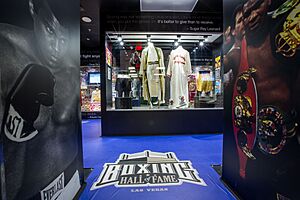
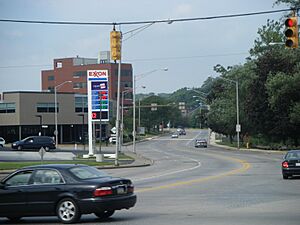
On January 22, 1988, Holmes came out of retirement to challenge Mike Tyson, who was the world heavyweight champion. Tyson knocked Holmes down three times in the fourth round, and the fight was stopped. This was the only time Holmes was knocked out in his career. After this fight, Holmes retired again.
Holmes returned to boxing in 1991 and fought more often. After five wins, he fought Ray Mercer, an undefeated Olympic Gold Medalist, on February 7, 1992. Holmes won by a decision, which was a surprise. This win earned Holmes a chance to fight Evander Holyfield for the Undisputed World Heavyweight Championship. On June 19, 1992, Holyfield defeated Holmes by a decision.
On April 8, 1995, he fought Oliver McCall for the WBC title. Holmes lost by a close decision. He continued to fight, but he was getting tired of the sport.
On January 24, 1997, Holmes had his last chance to fight for a heavyweight championship. He traveled to Copenhagen to fight IBO champion Brian Nielsen. Nielsen won by a close decision.
Holmes and George Foreman were supposed to fight in 1999, but the fight was canceled. Holmes's next two fights were rematches against old opponents, James "Bonecrusher" Smith and Mike Weaver, both of whom he stopped.
Larry Holmes's final fight was on July 27, 2002, when he defeated Eric "Butterbean" Esch by a decision.
Life After Boxing
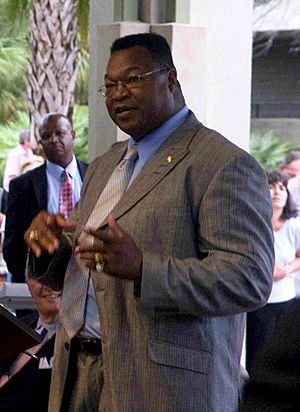
Larry Holmes invested the money he earned from boxing and settled in his hometown of Easton, Pennsylvania. When he retired, he had many businesses and employed over 200 people. In 2008, he owned restaurants, a nightclub, and other businesses. As of 2009, Holmes co-hosted a talk show.
In 2016, Holmes appeared as himself in an episode of Mike Tyson Mysteries.
As of July 28, 2025, Larry Holmes is the oldest living heavyweight boxing champion.
Honors and Family
Larry Holmes was inducted into the International Boxing Hall of Fame in 2008.
In 1979, Larry Holmes married Diane Robinson, and they have two children. He also has three daughters from earlier relationships. As of 2019, Holmes lives near Easton, Pennsylvania. His younger brother, Mark Holmes, was also a middleweight boxer.
Images for kids
See also
 In Spanish: Larry Holmes para niños
In Spanish: Larry Holmes para niños
 | Selma Burke |
 | Pauline Powell Burns |
 | Frederick J. Brown |
 | Robert Blackburn |


